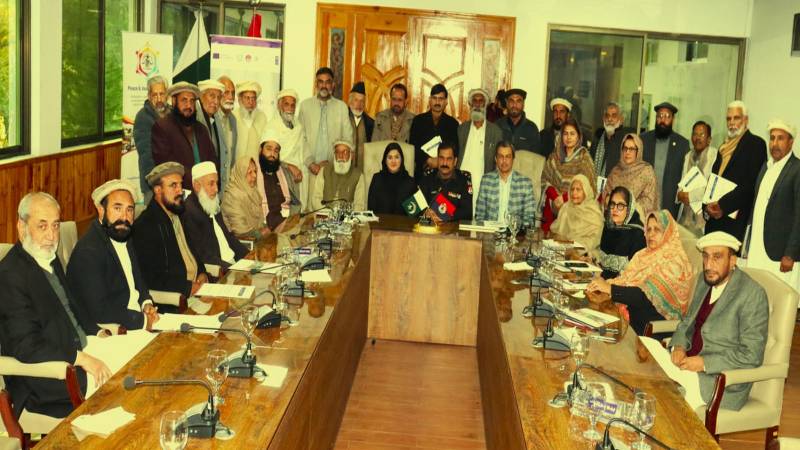
The Peace & Justice Network (PJN), in collaboration with the UNDP Pakistan and Khyber Pakhtunkhwa Police, organized the Hazara Divisional Consultative Workshop, aimed at identifying actionable recommendations to strengthen Dispute Resolution Councils (DRCs) under the EU-funded Deliver Justice Project.
DRCs, established by the Khyber Pakhtunkhwa Police (KP), are pivotal in addressing the challenges of access to justice, particularly for marginalized communities, by ensuring grassroots justice. These councils serve as alternative dispute resolution mechanisms, providing a platform to resolve conflicts efficiently and amicably without resorting to formal court systems. Strengthening these councils is crucial for enhancing access to justice, as many individuals, especially in rural and marginalized communities, face barriers in accessing formal courts due to high costs, procedural complexities, and geographic constraints. Furthermore, DRCs help reduce the burden on courts, promote timely and cost-effective dispute resolution, and play a critical role in conflict prevention, social cohesion, and peacebuilding.
The workshop served as a platform for diverse stakeholders, including representatives from the DRCs of Haripur, Abbottabad, Mansehra, Battagram, Torghar, and Kohistan (Upper, Lower, and Kolai Pallas), as well as the judiciary, law enforcement, civil society, and community leaders. Together, they shared insights and developed strategies to enhance the capacity and efficiency of DRCs. The primary objective was to create a comprehensive action plan to empower DRCs as effective mechanisms for resolving disputes and improving access to justice across the region.
In the opening sessions, Syed Raza Ali, CEO of the Peace & Justice Network, and Salma Zeb, Legal Aid & ADR Officer at the Rule of Law Program, UNDP Pakistan, highlighted the importance of strengthening DRCs in Khyber Pakhtunkhwa to enhance their ability to serve communities effectively in dispute resolution. By addressing existing gaps—such as inadequate resources, limited training for members, lack of inclusivity, and insufficient public awareness—DRCs can become more efficient, accessible, and responsive to community needs. Strengthened DRCs not only provide timely and cost-effective justice but also help reduce the burden on formal courts and foster social harmony at the grassroots level.
Muhammad Shoaib, District & Session Judge of Abbottabad, presented a comprehensive framework for strengthening DRCs in Khyber Pakhtunkhwa. He emphasized that DRCs are a vital component of the justice system, offering alternative, community-driven solutions for resolving disputes efficiently and amicably. Strengthening these councils builds trust between communities and the justice system, helping bridge governance gaps. By involving community members such as elders and respected local figures in mediation, DRCs promote local ownership of the justice process and foster stronger community ties.
DPO Abbottabad, Umar Tufail, highlighted the pivotal role of DRCs in fostering peace and justice within local communities during his keynote address. He emphasized that DRCs not only ease the workload of formal courts but also offer a culturally sensitive and accessible avenue for dispute resolution. Enhancing these councils is crucial for ensuring fair and equitable access to justice for all.
Nida Khan, Advocate and PJN Rule of Law Advisor, highlighted the importance of making the DRC system in Khyber Pakhtunkhwa more gender-responsive and inclusive.
DPO Mansehra, Shafiullah Khan Gandapur, in his keynote address, emphasized the vital role played by DRC members in promoting justice and resolving disputes. He acknowledged their volunteer services and pledged his full support in addressing the challenges faced by DRCs. Recognizing their significance, he recommended raising the issue of budget allocation with the provincial government and the chief secretary. Additionally, he suggested organizing a multi-stakeholder coordination workshop to foster effective collaboration among DRCs, the judiciary, and other relevant institutions.
During the workshop, participants discussed challenges faced by DRCs in delivering justice and maintaining community trust, as well as best practices for alternative dispute resolution tailored to the socio-cultural context of Hazara Division. They also presented recommendations for capacity building, inclusivity, and resource mobilization to strengthen DRCs. The workshop's outcomes included actionable recommendations to enhance the legal and procedural frameworks governing DRCs, increase inclusivity—especially regarding the participation of women and other vulnerable communities—and provide technical and operational training to DRC members. Improving collaboration between DRCs and formal justice institutions was also emphasized for seamless coordination.
The consultative workshop concluded with a shared commitment to advancing the proposed action plan and ensuring continued support for DRCs. In his concluding remarks, DPO Mansehra, Shafiullah Khan, reaffirmed the police's commitment to strengthening DRCs. He also expressed gratitude to the Peace & Justice Network and UNDP Pakistan for spearheading this initiative.
